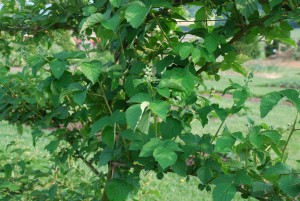Blackberries (Rubus spp.) are among the easiest fruit crops to grow in the Southern Appalachian region (USDA hardiness zones 5 and 7), but are not as hardy as raspberries.
A blackberry planting has a productive life between 8-10 years. A sturdy trellis system, composed of strong posts and wire, will make harvest chores easier. You can expect a partial crop the second year after planting and full crops in year three and beyond. Blackberry culture is similar for raspberries.
Select and prepare the planting site. Blackberries prefer open full sun and grow best in well-drained, sandy loam soils rich in organic matter. Avoid low ground areas which suffer from poor air and soil drainage. An available water supply is necessary for maximum berry yields and size.
Soil preparation is most important for multi-year harvests. Test your soil to determine its pH and fertility levels. Blackberries prefer a acidic soil pH range between 5.6 to 6.2. Most county Extension offices offer soil testing services for a small fee.
Based on your soil report, add generous amounts of organic matter and well-rotted manure to garden soil. Unless your soil analysis states differently, broadcast 20 to 25 pounds of 10-10-10 fertilizer per 1,000 square feet over the planting area.
Blackberries require good field sanitation which includes annual cane pruning. They have few disease and pest problems. Weeds will be a common problem as they attract potentially serious pests. Mulching helps reduce weed infestations and conserve soil moisture.
Select virus-free, high yielding, and great tasting varieties. Blackberry Varieties* (by order of ripening):
Thorned:
- Choctaw –small berry, high yields
- Chickasaw –large berries
- Kiowa –very large berries
- Shawnee –high yields
Thornless Erect:
- Natchez –large berries
- Arapaho –low yields
- Ouachita –high sugar levels
- Navaho –firm berries
- Apache –large berries, white drupelets
Thornless Semi-erect:
- Chester –very high yields, late ripening
- Triple Crown
* Blackberry varieties recommended by Dr. David Lockwood, Fruit Specialist with the Universities of Tennessee and Georgia


 Posted in
Posted in 
